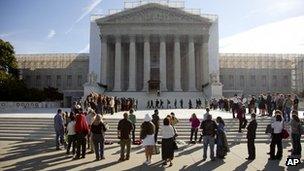US Supreme Court to hear landmark cases
- Published

The new term at the court brought onlookers to Capitol Hill on Monday
The US Supreme Court has begun its new term, with arguments and rulings expected on several landmark cases.
The court is likely to hear cases on issues including affirmative action, gay marriage and voting rights.
The justices will also consider a challenge to a law permitting overseas surveillance, and whether US courts can rule on human rights violations abroad.
The court has been in recess since it upheld President Barack Obama's healthcare reform bill in June.
In a 5-4 ruling, the court said the law's core requirement, known as the "individual mandate" was constitutional.
However, correspondents say the latest term could be even more significant, with rulings likely on issues that touch on several hotly disputed areas of American life.
October agenda
The Supreme Court was to begin its term by hearing a case on Monday that concerns 12 Nigerians who have sued a subsidiary of Shell oil company.
The 12 allege that Shell aided and abetted human rights violations in Nigeria between 1992 and 1995.
The justices must decide whether a law known as the Alien Tort Statute permits US courts to rule on that case.
Early October will also see the bench hear arguments in a major case on affirmative action in public universities. Abigail Fisher, a white student, has alleged that she was unfairly denied admission at the University of Texas because of her race.
Earlier Supreme Court rulings have upheld the right for universities to consider race as one of many factors in the admissions process - although quotas are forbidden.
Later in the term the justices will consider two separate cases relating to gay marriage.
In one case, several parties have challenged a federal law known as the Defense of Marriage Act (Doma), a measure that denies federal benefits available for straight couples to legally married same-sex couples.
In 2011, President Obama instructed the Department of Justice not to defend the law.
The second case could deliver a final ruling on an ongoing legal wrangle over a gay marriage ban in the state of California, a law known as Proposition 8. If the court decides not to hear the case, same-sex marriage is likely to be re-introduced in California.
The bench could also examine Section 5 of the 1965 Voting Rights Act - a provision that forces nine US states with a history of electoral discrimination to have all changes to voting rules first approved in Washington.
Lawyers representing Shelby County, Alabama, have said "things have changed in the South", and that Congress should not have extended Section 5 for another 25 years in 2006.
Finally, the court may also hear a challenge to the constitutionality of a 2008 law that expanded the government's mandate to carry out secret electronic surveillance of foreigners overseas.
The government has said human rights groups do not have the right to bring the case.
The US high court also denied the petition of a Florida man challenging the use of full-body scanners at airports.
Federal courts in Jonathan Corbett's home state had refused to hear his lawsuit, saying it could only be filed with the federal appeals court in Washington.
An appeal court in Atlanta, Georgia, upheld that dismissal, and the US Supreme Court refused to reopen the case.
- Published2 October 2012
- Published1 August 2012